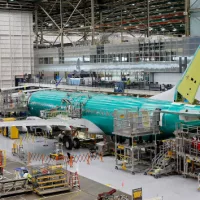
(NEW YORK) — Tens of thousands of Boeing workers have voted to strike after rejecting the proposed contract from the embattled aerospace company — a move with far-reaching implications for the U.S. economy.
Boeing had reached a tentative agreement earlier this week with the International Association of Machinists and Aerospace Workers, or IAM, the union representing 33,000 workers at Boeing plants in Washington State, Oregon and California.
However, union members rejected the contract agreement on Thursday night with a vote of 94.6%. IAM’s members will strike at midnight on Friday after 96% voted for the action.
“The message was clear that the tentative agreement we reached with IAM leadership was not acceptable to the members,” Boeing said in a statement following the strike vote. “We remain committed to resetting our relationship with our employees and the union, and we are ready to get back to the table to reach a new agreement.”
A work stoppage would weaken Boeing as it struggles to recover from a years-long stretch of scandals and setbacks, hamstringing the nation’s largest exporter, experts told ABC News. But, they added, workers are frustrated with what they perceive as inadequate compensation and a sense they must sacrifice to make up for the company’s mismanagement.
Here’s what to know about what’s behind the strike and its implications for the U.S. economy:
Why are Boeing workers preparing to strike?
Neither Boeing nor the IAM wants a strike. The workers might carry one out anyway.
The tentative agreement struck this week delivers a 25% raise over the four-year duration of the contract, as well as worker gains on healthcare costs and retirement benefits. The union had sought a 40% pay increase over the life of the deal.
The agreement also features a commitment from Boeing to build its next commercial plane with union labor in Washington state.
Boeing touted the strength of its offer earlier this week. “Simply put, this is the best contract we’ve ever presented,” Stephanie Pope, Boeing Commercial Airplanes president and CEO, wrote in a letter to union members obtained by ABC News.
The union echoed support for the agreement, urging workers to ratify the deal.
“We have achieved everything we could in bargaining, short of a strike. We recommended acceptance because we can’t guarantee we can achieve more in a strike,” IAM District 571 President Jon Holden, who leads the union local involved in negotiations, told members in a public letter.
In response to ABC News’ request for comment, a Boeing spokesperson pointed to a letter sent to union members by CEO Kelly Ortberg.
“I hope you will choose the bright future ahead, but I also know there are employees considering another path — and it’s one where no one wins,” Ortberg said.
“For Boeing, it is no secret that our business is in a difficult period, in part due to our own mistakes in the past. Working together, I know that we can get back on track, but a strike would put our shared recovery in jeopardy, further eroding trust with our customers and hurting our ability to determine our future together,” Ortberg added.
IAM declined to respond to ABC News’ request for comment.
Still, the vote indicates that workers are ready to defy the company and the union. For years, West Coast Boeing workers have taken issue with their level of compensation, especially in light of strong company performance and a surge in the cost of living, experts said.
“There are years and years of pent-up frustration among Boeing workers,” Jake Rosenfeld, a professor of sociology at Washington University in St. Louis who studies labor, told ABC News. “This is an expression of being completely fed up.”
Union members also view themselves as being asked to make sacrifices made necessary by the company’s mismanagement, said Henry Harteveldt, a travel industry analyst at Atmosphere Research Group.
In January, a door plug blew out of the company’s 737 Max 9 aircraft during an Alaska Airlines flight, prompting a federal investigation. The renewed scrutiny arrived roughly five years after Boeing 737 Max aircraft were grounded worldwide following a pair of crashes in Indonesia and Ethiopia that killed a combined 346 people.
In 2021, after a two-year ban, Boeing 737 Max aircraft were permitted to fly.
Boeing is carrying nearly $60 billion in debt, Pope noted in her letter to union members. The company’s share price has plummeted almost 40% since the outset of 2024. Ortberg took over as CEO last month.
“The workers cannot and should not be expected to bear all of the burden of the changes needed at Boeing,” Harteveldt said.
“But I don’t think Boeing is asking them or expecting them to do that,” Harteveldt added. “Boeing has extended what appears to be a very generous offer with substantial wage increases.”
What’s at stake in a potential Boeing strike?
Boeing, which employs 145,000 U.S.-based workers, is a major U.S. firm with a sprawling network of suppliers, experts said.
The company estimates that it contributes nearly $80 billion to the U.S. economy each year, and indirectly accounts for 1.6 million jobs.
A prolonged strike would weaken production with the potential to slow output, diminish income and trigger layoffs, Harteveldt said.
“There’s a risk of a downward spiral,” Harteveldt said.
Such a strike would not impact flight activity or down planes, however, since the workers at issue take part in manufacturing new products. That stands in contrast with an averted railroad strike in 2022, which would have halted a sizable share of the nation’s cargo trains.
“This wouldn’t be as devastating,” Rosenfeld said.
Still, he added, a potential strike would hold implications for a signature U.S. firm.
“It would further damage an iconic company that has already had years of setbacks,” Rosenfeld said.
Copyright © 2024, ABC Audio. All rights reserved.















